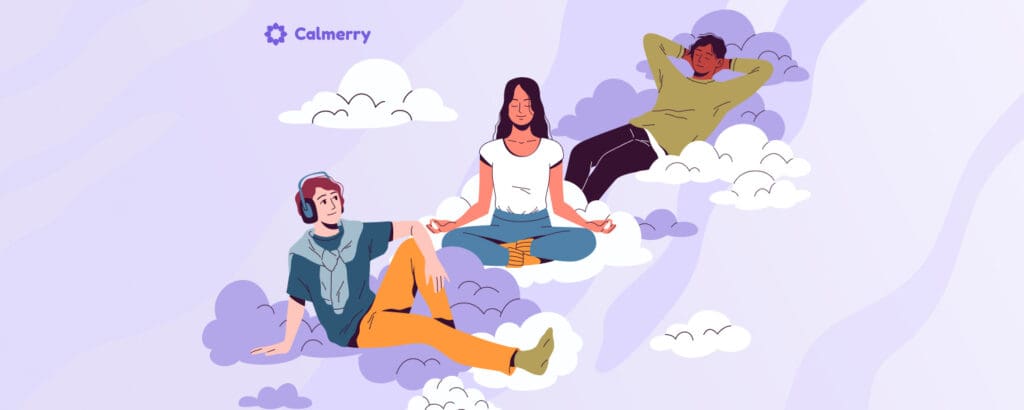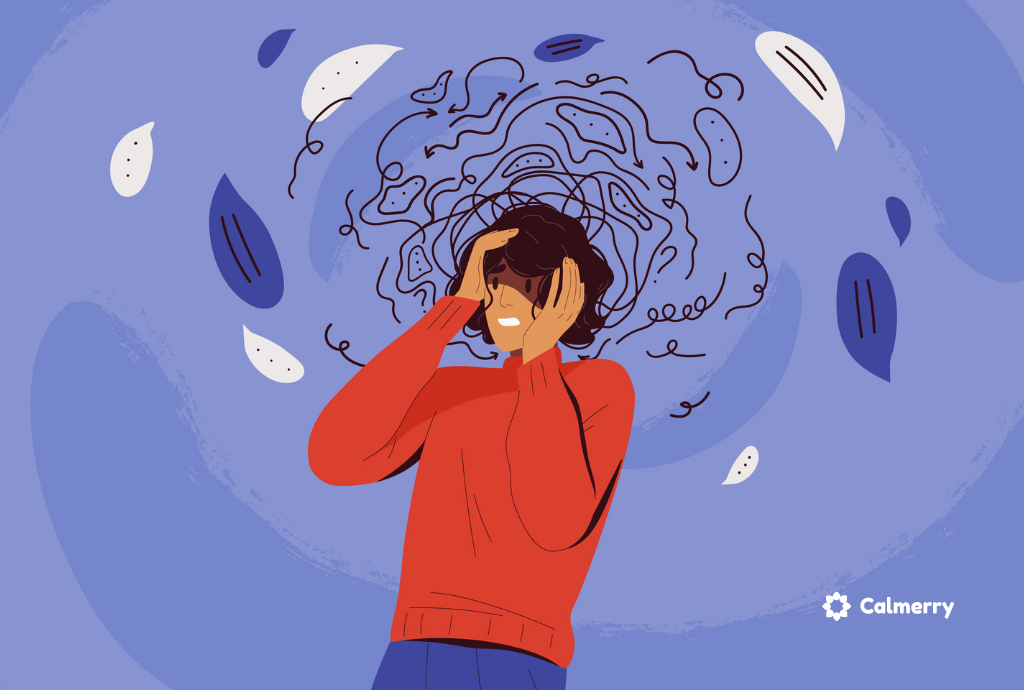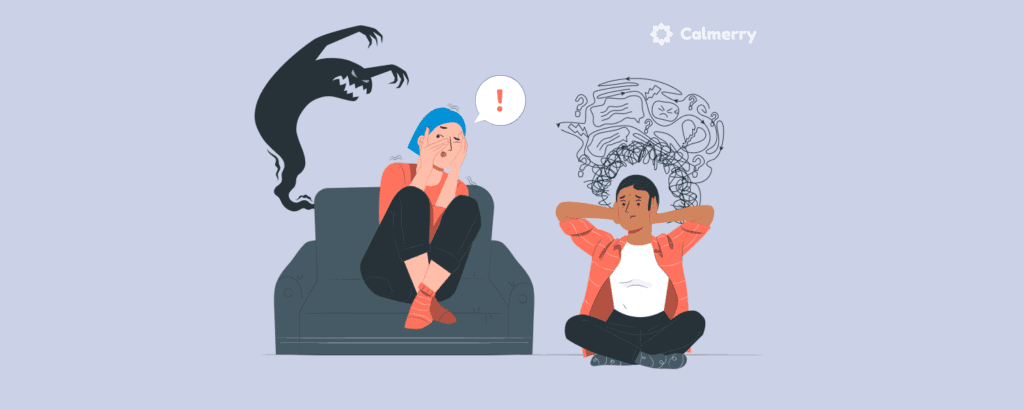What Is Claustrophobia – Symptoms, Causes, Treatment

In this article
What is claustrophobia?
What do we know about claustrophobia? Enclosure phobia is an intense fear of small spaces. It falls under a type of anxiety condition called a specific phobia. [1] Vadakkan, C. (2023, February 8). Claustrophobia. StatPearls – NCBI Bookshelf. https://www.ncbi.nlm.nih.gov/books/NBK542327/ [2] Eaton, W. W., Bienvenu, O. J., & Miloyan, B. (2018). Specific phobias. The Lancet Psychiatry, 5(8), 678–686. https://doi.org/10.1016/s2215-0366(18)30169-x
What does claustrophobia feel like?
Individuals with claustrophobia experience intense fear of confined spaces, such as small rooms, MRI machines, elevators, tunnels, or crowded places.
When someone has a phobia of small spaces, this fear can interfere significantly with daily life. For instance, it may be difficult for them to maintain meaningful relationships or be successful at a job.
Fortunately, there is an effective treatment for claustrophobia that gives people the ability to live normal lives. Learning about the causes and symptoms of this treatable condition and how it is treated can be helpful for learning how to better manage it so it does not interfere with wellbeing.
Physical symptoms of claustrophobia
If someone has referred to you as claustrophobic, or you believe you have this anxiety disorder, learning about its symptoms can help you to determine if that is the case.
Typical claustrophobia symptoms are as follows [1] Vadakkan, C. (2023, February 8). Claustrophobia. StatPearls – NCBI Bookshelf. https://www.ncbi.nlm.nih.gov/books/NBK542327/ :
Sweating and shaking
The intense fear of enclosed spaces triggers the body’s fight-or-flight response, causing excessive sweating and trembling, mainly of the hands and legs. That is how the body prepares itself physiologically for a perceived threat.
Chest tightness and rapid heartbeat
A confined space can trigger chest tightness and a racing heart. People with claustrophobia often report this as their body reacts to the perceived feared situation.
Breathing difficulties
Sometimes, the extreme fear of being enclosed may lead to having difficulties with breathing. This can lead to hyperventilation, shallow and fast breathing, and breathlessness.
Chills or hot flashes
Claustrophobia can disrupt body temperature. Someone may experience sudden chills or a hot, red face. It is a typical reaction, and many common phobias share these physical symptoms.
Choking feeling
Extreme fear and anxiety may heighten the feeling of suffocation, making it difficult to swallow even without physical blockage. Other fears, such as the fear of bees, may also trigger it.
Upset stomach
The stress response significantly impacts the digestive system. Claustrophobia can manifest as nausea or the “butterfly” feeling. This is due to stress hormones affecting gut function. The body stops lower-priority functions, e.g., digestion.
Dizziness
Feeling dizzy is another physical sign of claustrophobia. Hyperventilation reduces the quantity of blood reaching the brain. Consequently, this causes dizziness and the feeling of light-headedness, which may result in fainting if severe.
Dry mouth
During triggering situations, saliva production decreases. This can be a reason for the unpleasant sensation of a dry mouth. It is part of the stress response, a common symptom in phobias, that can make worse the presence of fear.
Feeling disoriented
The intense anxiety and physiological changes (e.g., reduced oxygen to the brain due to hyperventilation) can lead to temporary confusion and difficulty concentrating for people with claustrophobia. It may be hard to express their emotions clearly in this state.
Numbness
These sensations, often felt in the hands, feet, or face, are frequently caused by hyperventilation and altered blood flow. It’s the body’s way of signaling distress, pins and needles.
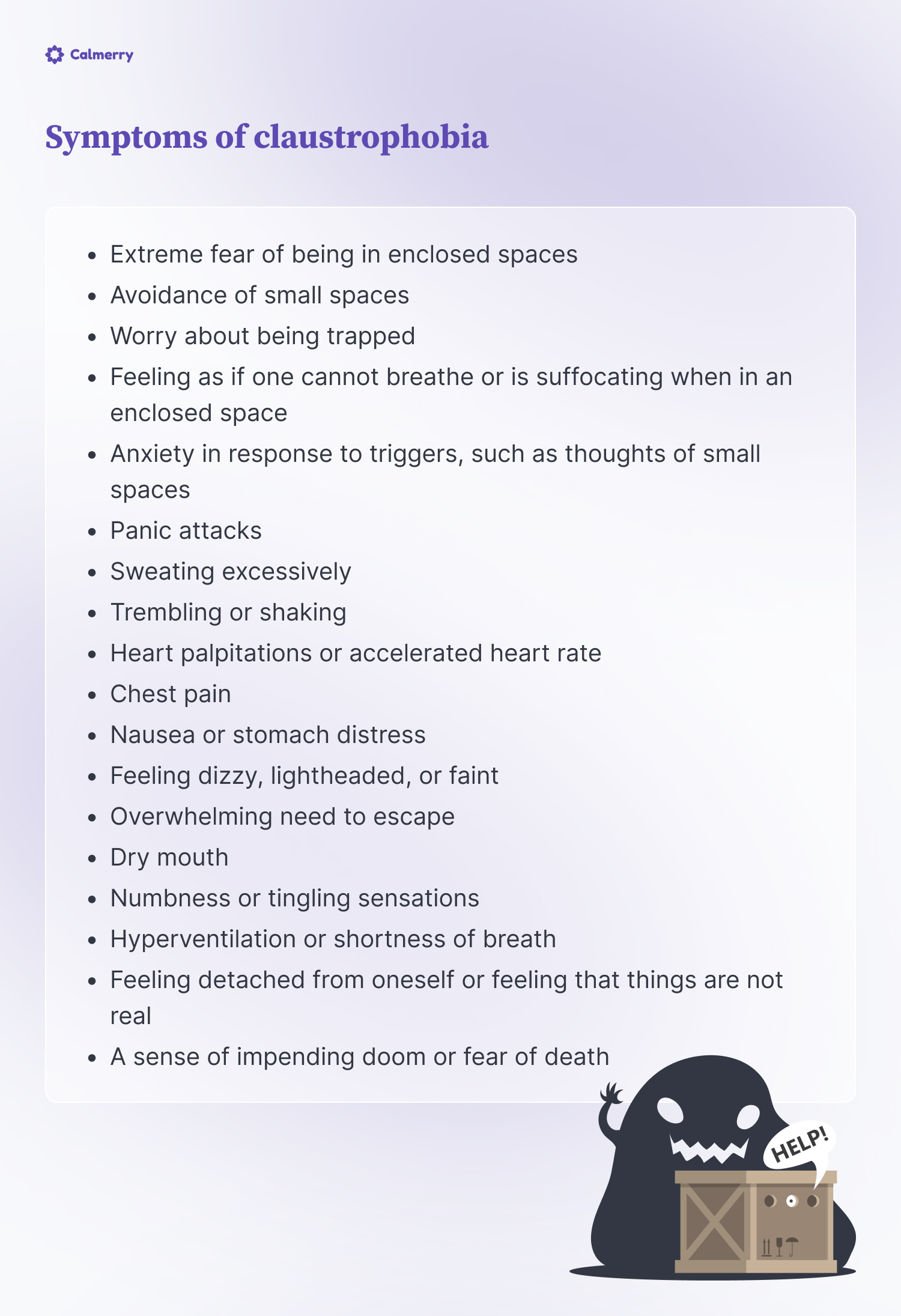
Ear ringing
Claustrophobic reactions can lead to stress and fluctuations in blood pressure, which produces a ringing or buzzing sound in the ears. This is not a hearing problem; it’s a symptom of your body’s fight or flight response.
Crying, tantrums, freezing
People with claustrophobia can struggle to express their emotions verbally. It can manifest as intense crying, temper tantrums, and becoming completely still (“freezing”).
Emotional symptoms of claustrophobia
Claustrophobia is the fear of enclosed spaces that can trigger a few pretty emotionally strong reactions. Let’s see some emotional symptoms, ranging from slight unease to panic attacks, which are really disruptive in a person’s daily life.
Fear of losing control
Claustrophobia can activate a tremendous feeling of losing control mentally and physically. The feeling of being shut in triggers them to panic, believing that they will have unmanageable reactions and a desperate need to regain control.
Fear of fainting
Intense anxiety may lead to symptoms of dizziness and, therefore, a real fear of fainting. This may be heightened by the feeling of being trapped, imagining falling with no means of escape or help in the confined area.
Feelings of dread
Claustrophobia can include a deep sense of something bad. It is more than simple fear or anxiety. It is a heavy, unsettling feeling in a feared object or situation.
Overwhelming anxiety
With this phobia, you can experience an intense wave of anxiety. It’s an all-consuming state of excessive fear, making it hard to think clearly or rationally and impacting the ability to function.
Urgent need to escape
Another symptom related to claustrophobia that often overlaps with agoraphobia. A core feeling is a desperate need to get out now. It’s a powerful drive fueled by anxiety.
Recognizing irrationality
People with claustrophobia often know their fear is excessive, but this understanding doesn’t help. The level of their fear doesn’t lessen it. Even knowing the fear doesn’t match the actual danger, the negative thoughts are uncontrollable.
Fear of dying
Severe forms may be associated with intense panic, leading to the development of a fear of dying. The physical feelings and overwhelming anxiety create a terrifying sensation that survival is threatened within the confined space.
How common is claustrophobia?
Prevalence data give us a general idea of how common claustrophobia is in the general population.
According to government data, around 12.5% of the population experiences claustrophobia at some point during their lifetimes. [3] Anxiety disorders. (n.d.). National Institute of Mental Health (NIMH). https://www.nimh.nih.gov/health/topics/anxiety-disorders
Research with patients undergoing Magnetic resonance imaging (MRI) provides additional insights into the prevalence of severe claustrophobia. According to this research, an average of 2.3% of patients who need an MRI must be sedated, or are unable to complete the procedure, because of severe symptoms.
Who gets claustrophobia
There is not one singular cause of claustrophobia. Rather, the condition results from several risk factors that make a person more likely to develop phobias.
In general, claustrophobia is the result of dysfunctional activity in the brain. [1] Vadakkan, C. (2023, February 8). Claustrophobia. StatPearls – NCBI Bookshelf. https://www.ncbi.nlm.nih.gov/books/NBK542327/ For instance, the frontal lobes, which are responsible for rational thought and self-control, are unable to temper the activity of the emotionally responsive amygdala.
Beyond this, there are some general risk factors that make it more likely that a person will develop phobias, including claustrophobia. [3] Anxiety disorders. (n.d.). National Institute of Mental Health (NIMH). https://www.nimh.nih.gov/health/topics/anxiety-disorders
These include:
- Traumatic life experiences
- Having a history of feeling nervous in new situations
- A family history of anxiety disorders or other mental health conditions
Is claustrophobia genetic?
Genes can make it more likely that a person will develop claustrophobia. In fact, researchers have found that a defect in a single gene is associated with the development of claustrophobia symptoms. [4] El-Kordi, A., Kästner, A., Grube, S., Klugmann, M., Begemann, M., Sperling, S., Hammerschmidt, K., Hammer, C., Stepniak, B., Patzig, J., De Monasterio-Schrader, P., Strenzke, N., Flügge, G., Werner, H., Pawlak, R., Nave, K., & Ehrenreich, H. (2013). A single gene defect causing claustrophobia. Translational Psychiatry, 3(4), e254. https://doi.org/10.1038/tp.2013.28
What triggers claustrophobia?
Claustrophobia symptoms typically arise when someone is in an enclosed space in which they feel trapped.
Some situations that can trigger symptoms include:
- Riding on a crowded bus
- Being in a small or locked room
- Riding in an elevator
- Walking through a tunnel
- Being in a large crowd where fast escape is difficult
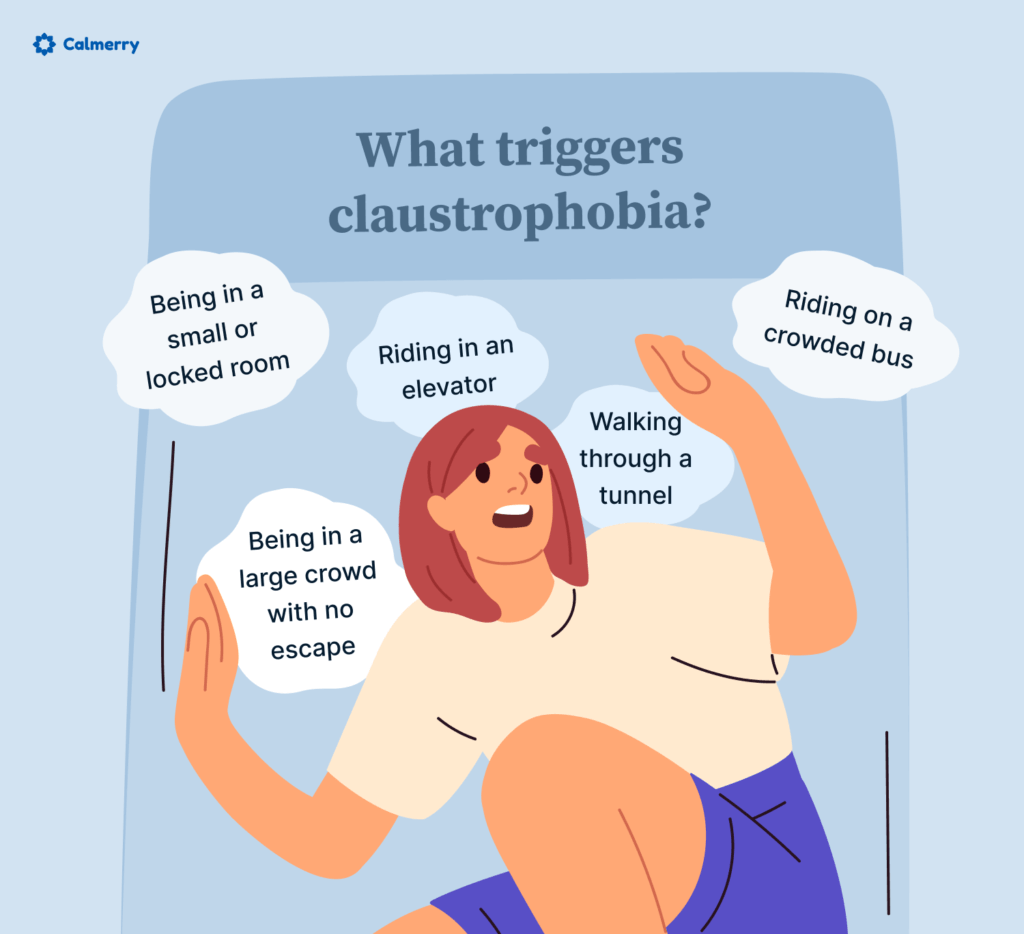
Some people may experience symptoms of claustrophobia when receiving care in a medical office. For instance, a person can feel claustrophobic when sitting in a dentist’s chair or when inside an MRI machine.
These tight spaces can make it seem like one is trapped, triggering symptoms.
Any situation in which a person feels trapped and as if their movement is restricted can trigger symptoms.
They may feel as if they cannot breathe or worry about having a panic attack when they feel trapped. These feelings can trigger a cascade of fear and anxiety-related symptoms.
Diagnosis and tests
Diagnosing claustrophobia requires an in-depth analysis, mostly discussion with a mental professional about your symptoms, triggers, and the disruption in living caused by such signs. Thus, diagnostic criteria, usually used in the DSM-5, can certainly establish whether or not these levels of fear and avoidance are demonstrated.
There are no medical tests, either blood tests or scans, to diagnose claustrophobia. It is thus diagnosed based on the described experience and clinical examination.
Can claustrophobia go away?
Claustrophobia doesn’t typically just go away naturally, but it can be treated. Left untreated, it is often chronic and linked with co-occurring disorders like depression.
When claustrophobia isn’t treated, it may grow worse with time, causing significant impairment in daily life. A person with untreated claustrophobia may withdraw from social interaction or have a hard time maintaining a job.
Management and treatment
Treatment of claustrophobia provides individuals with the ability to live a normal life. With quality treatment, which often involves therapy, medication, or a combination of the two, it is possible to overcome the fear of being enclosed in small spaces so that you can participate more fully in life.
How is claustrophobia treated?
Therapy for anxiety disorders can be beneficial for overcoming claustrophobia. There are numerous different therapeutic methods used in the treatment of these conditions. One of the most common treatments is cognitive behavioral therapy (CBT). [1] Vadakkan, C. (2023, February 8). Claustrophobia. StatPearls – NCBI Bookshelf. https://www.ncbi.nlm.nih.gov/books/NBK542327/
Cognitive behavioral therapy
CBT can help individuals with claustrophobia overcome negative or distorted thinking patterns leading to symptoms. With the guidance of a therapist, a person can learn to replace distorted thinking patterns with logical, healthier thought processes.
Exposure therapy
Claustrophobia can also be treated with exposure therapies, which as the name suggests, expose people to the source of their fear with the guidance of a therapist. [1] Vadakkan, C. (2023, February 8). Claustrophobia. StatPearls – NCBI Bookshelf. https://www.ncbi.nlm.nih.gov/books/NBK542327/
Today, exposure therapy can be conducted using virtual reality tools. These tools can expose people to the sensation of being in an MRI machine, for example, so they can learn to reduce the fear associated with it.
Are medications used to treat claustrophobia?
Some people may benefit from taking medication to cope with symptoms. [1] Vadakkan, C. (2023, February 8). Claustrophobia. StatPearls – NCBI Bookshelf. https://www.ncbi.nlm.nih.gov/books/NBK542327/ A type of anxiety medication called benzodiazepines may be prescribed in small quantities when a person cannot avoid the source of their phobia (i.e., if they need an MRI for a medical condition).
Other medications used in treatment belong to a class of drugs called selective serotonin reuptake inhibitors (SSRIs). [1] Vadakkan, C. (2023, February 8). Claustrophobia. StatPearls – NCBI Bookshelf. https://www.ncbi.nlm.nih.gov/books/NBK542327/
These medications are typically used to treat depression but can also be helpful for anxiety disorders. Medications in this class include paroxetine and escitalopram.
Prevention claustrophobia
Feeling confined can be tough. Start with brief, controlled exposures to small spaces, and breathe deeply. Remind yourself you’re safe. Therapy and even virtual reality can also provide tools to manage these feelings effectively.
What can I do to better cope with claustrophobia?
While appropriate treatment can help you heal the phobia, there are also ways to cope and self-help strategies that can be useful when learning how to deal with symptoms.
Consider the following tips for managing claustrophobia:
- Learn relaxation techniques: relaxation techniques like deep breathing and meditation can be helpful if you’re living with claustrophobia symptoms. These techniques can calm the body and keep your stress levels lower. You might consider practicing these techniques when you start to experience panic symptoms related to claustrophobia.
- Enlist social support: telling trusted friends and family members about your fears can be beneficial. It’s helpful to have people in your corner who understand what you’re experiencing. These can be people you turn to when you’re feeling stressed or who can accompany you during fear-provoking situations, such as riding in public transportation.
- Find a support group: support groups for anxiety disorders allow you to connect with people experiencing similar struggles. You can share your experiences and learn coping strategies that have been useful for others.
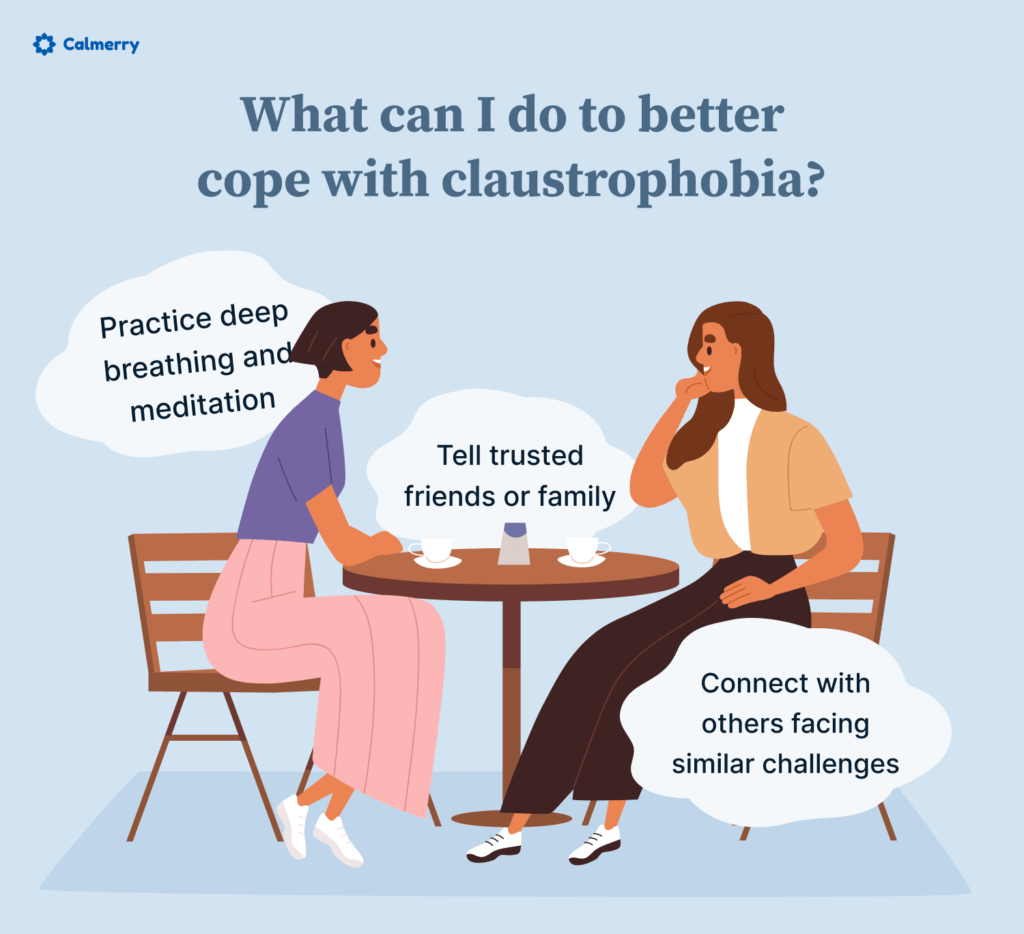
How to help someone with claustrophobia
If a loved one has claustrophobia, it’s important to be understanding. Try to learn more about the condition so that you understand what they’re experiencing.
While they are trying to overcome a phobia, offer support and encouragement by suggesting that they seek treatment and be available to talk when they’re feeling stressed.
How to help someone with claustrophobia
If a loved one has claustrophobia, it’s important to be understanding. Try to learn more about the condition so that you understand what they’re experiencing.
Offer support and encouragement by suggesting that they seek treatment and be available to talk when they’re feeling stressed.
Get help on Calmerry
If you’re looking for claustrophobia treatment, Calmerry is here to help.
We offer online therapy with credentialed mental health professionals trained in treating specific phobias.
Fill out a brief survey to get matched with a professional in your particular problem within 1 hour – and get started with therapy from the comfort of home.
FAQs
What are the common symptoms of claustrophobia?
Such signs of a phobia may include feelings of intense and irrational fear or anxiety when in a confined situation or object, such as an elevator or small room. Physical symptoms like sweating, rapid heartbeat, and difficulty breathing are common.
What causes claustrophobia?
A phobia often develops after a traumatic event involving a confined space. It’s an intense and irrational fear where it doesn’t match the actual danger. Genetics and learned behavior can also contribute to claustrophobia.
How is claustrophobia treated?
Treatment options may include talk therapy (like CBT) to challenge negative thoughts and exposure therapy to gradually face the feared situation or object. Medication (antidepressant or anti-anxiety drugs), in addition to therapy, may also help treat your fear and overall anxiety. Relaxation and visualization can help calm your nerves.
Can claustrophobia go away on its own?
While claustrophobia may disappear in some cases, particularly in children, it often persists without treatment. Seeking professional help increases the ability to function and live a normal life. It’s certainly possible to overcome claustrophobia and learn to cope.
Are there specific triggers for claustrophobia?
Yes, triggers may include elevators, small rooms, tunnels, crowded places, or any situation or space where escape feels limited.
Can children develop claustrophobia?
Yes, children may develop claustrophobia, often after experiencing a frightening event in a confined space. Symptoms and causes mirror adult.
Is claustrophobia just anxiety?
Claustrophobia is an anxiety condition, so it does involve symptoms of anxiety.
In addition to severe anxiety related to being in enclosed spaces, individuals with claustrophobia often experience intense fear and are likely to avoid places where they feel enclosed or trapped.
Can you die from claustrophobia?
People who experience claustrophobia symptoms may worry they are going to die, but the condition itself is not fatal. Feeling claustrophobic can make a person feel as if they are suffocating, which can make them worry about death.
Panic symptoms like chest pain can also make a person worry they are experiencing a heart attack.
While symptoms can feel life-threatening, the reality is that claustrophobia will not kill you. It can make you feel panicked, and these symptoms can mirror life-threatening situations like heart attack or respiratory distress.
How to deal with claustrophobia on a plane
If you’re riding on a plane, and you know that this will be a trigger for symptoms, it can be helpful to talk with your doctor in advance of the trip. They may be able to prescribe a small supply of benzodiazepines, an anxiety medication that can reduce symptoms of panic.
You can also practice calming strategies like deep breathing exercises while on the plane.
If you can, travel with a close friend or relative who is willing to support you along the way.
Vadakkan, C. (2023, February 8). Claustrophobia. StatPearls – NCBI Bookshelf. https://www.ncbi.nlm.nih.gov/books/NBK542327/
Eaton, W. W., Bienvenu, O. J., & Miloyan, B. (2018). Specific phobias. The Lancet Psychiatry, 5(8), 678–686. https://doi.org/10.1016/s2215-0366(18)30169-x
Anxiety disorders. (n.d.). National Institute of Mental Health (NIMH). https://www.nimh.nih.gov/health/topics/anxiety-disorders
El-Kordi, A., Kästner, A., Grube, S., Klugmann, M., Begemann, M., Sperling, S., Hammerschmidt, K., Hammer, C., Stepniak, B., Patzig, J., De Monasterio-Schrader, P., Strenzke, N., Flügge, G., Werner, H., Pawlak, R., Nave, K., & Ehrenreich, H. (2013). A single gene defect causing claustrophobia. Translational Psychiatry, 3(4), e254. https://doi.org/10.1038/tp.2013.28
online therapy
live video session

